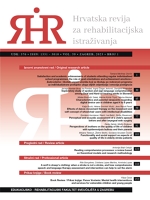A wolf in sheep’s clothing: when a stroke is not a stroke, and how comprehensive speech and language therapy assessment and intervention can help to set the alarm
A wolf in sheep’s clothing: when a stroke is not a stroke, and how comprehensive speech and language therapy assessment and intervention can help to set the alarm
Author(s): Rita Gonçalves, Cristiana Lopes Martins, Arminda LopesSubject(s): Health and medicine and law, Demography and human biology, Welfare services
Published by: Sveučilište u Zagrebu, Edukacijsko-rehabilitacijski fakultet
Keywords: case report; aphasia; dysphagia; rehabilitation; progressive multifocal leukoencephalopathy; speech therapy; HIV; stroke;
Summary/Abstract: A 70-year-old male patient, who was diagnosed with human immunodeficiency virus (HIV) in 2001 and did not undergo antiretroviral therapy, was admitted two months after the onset of left cortical-subcortical ischemic stroke, with involvement of the corona radiata and the left thalamus. As a consequence of this vascular event, he suffered aphasia, severe dysarthria, dysphagia, and right hemiparesis. The patient took part in a rehabilitation program at a rehabilitation centre for neurological diseases with a specialised interdisciplinary rehabilitation team. He underwent speech therapy intervention with a frequency of 2-3 hours per day. Despite the intensity of the program, there was a decline in his clinical and functional status during hospitalisation, with decreased capacity to swallow and communicate (either because of the exacerbation of the aphasia, or due to the worsening of dysarthria and apraxic features). Due to this global deterioration, additional imaging, as well as serological and aetiological examination was performed, which led to a diagnosis of progressive multifocal leukoencephalopathy in the context of HIV1 infection. Antiretroviral therapy was administered to reverse the symptoms. This case illustrates the relevance of clinical disclosure for the establishment of appropriate functional prognoses and discharge planning. It also shows that the initial clinical features can be misleading and can lead to concealment of the real aetiology, as well as delays in appropriate treatment, especially in multipathology patients.
Journal: Hrvatska revija za rehabilitacijska istrazivanja
- Issue Year: 59/2023
- Issue No: 1
- Page Range: 144-151
- Page Count: 8
- Language: English

